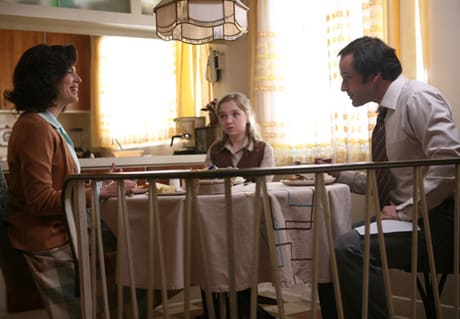The film opens with brilliant saturated colours on a young girl, who is dressed like Jonbenet Ramsey, riding her bicycle down a desolate dirt road. There is nothing but fields for miles on each side of her. Dolly Parton's "The Seeker" plays in the background as the girl pedals and pedals, getting closer to the camera.
In the '70s, in an average suburban town in Manitoba, green grass glistens on the front lawns and hints of second wave feminism are in the air. Elizabeth (Julia Stone), our main character, is from a traditional nuclear family; her mother (Macha Grenon) is staunchly conservative. She's still living in the '50s and very out of touch with social progress. Elizabeth's father is kinder, but also quite reserved. Belle, Elizabeth's best friend, is from the other side of the fence (literally living across the street). Her mother, a Streisand look-alike, is an avid listener of Dolly Parton and an advocate of feminism.
The dichotomy between progression and regression is evident and well structured after the first ten minutes. Belle and Elizabeth are typical 11-year-olds anxiously awaiting their periods and discussing bra sizes. After Elizabeth's parents accidentally reveal she's adopted and Belle dumps Elizabeth to hang out with the girls who have already hit puberty, her entire reality is shattered and the only person she can turn to is Dolly Parton. Elizabeth, having childish delusions, believes that Parton is her birth mother due to her birthmark resembling a butterfly, and the presence of the insect in Parton's music. Thus, Elizabeth's adventure begins, as she dresses herself like the busty country star and sets out on the open road for Parton's concert in Minneapolis.
Replete with a haunting Dolly Parton soundtrack, the film succeeds as a gentle meditation on an adolescent girl's pubescent confusion. Elizabeth is an easy character to sympathize with, both because of her living conditions in a strict household and the sudden revelation that she was once an orphan. The saturated colours add to the realism of the '70s setting, accentuating the various styles of dress (Dolly Parton's, Elizabeth's mother's, Belle's mother's).
The film is a melodramatic reflection of the '70s and women's liberation. Macha Grenon's performance as Elizabeth's cautious mother is worth seeing; she portrays a worrying mother with authenticity that shines through the screen onto mothers, fathers and prospective parents alike. The Year Dolly Parton Was My Mom is a good testament to Canadian cinema, despite its mildly disappointing ending.
(Mongrel Media)In the '70s, in an average suburban town in Manitoba, green grass glistens on the front lawns and hints of second wave feminism are in the air. Elizabeth (Julia Stone), our main character, is from a traditional nuclear family; her mother (Macha Grenon) is staunchly conservative. She's still living in the '50s and very out of touch with social progress. Elizabeth's father is kinder, but also quite reserved. Belle, Elizabeth's best friend, is from the other side of the fence (literally living across the street). Her mother, a Streisand look-alike, is an avid listener of Dolly Parton and an advocate of feminism.
The dichotomy between progression and regression is evident and well structured after the first ten minutes. Belle and Elizabeth are typical 11-year-olds anxiously awaiting their periods and discussing bra sizes. After Elizabeth's parents accidentally reveal she's adopted and Belle dumps Elizabeth to hang out with the girls who have already hit puberty, her entire reality is shattered and the only person she can turn to is Dolly Parton. Elizabeth, having childish delusions, believes that Parton is her birth mother due to her birthmark resembling a butterfly, and the presence of the insect in Parton's music. Thus, Elizabeth's adventure begins, as she dresses herself like the busty country star and sets out on the open road for Parton's concert in Minneapolis.
Replete with a haunting Dolly Parton soundtrack, the film succeeds as a gentle meditation on an adolescent girl's pubescent confusion. Elizabeth is an easy character to sympathize with, both because of her living conditions in a strict household and the sudden revelation that she was once an orphan. The saturated colours add to the realism of the '70s setting, accentuating the various styles of dress (Dolly Parton's, Elizabeth's mother's, Belle's mother's).
The film is a melodramatic reflection of the '70s and women's liberation. Macha Grenon's performance as Elizabeth's cautious mother is worth seeing; she portrays a worrying mother with authenticity that shines through the screen onto mothers, fathers and prospective parents alike. The Year Dolly Parton Was My Mom is a good testament to Canadian cinema, despite its mildly disappointing ending.
